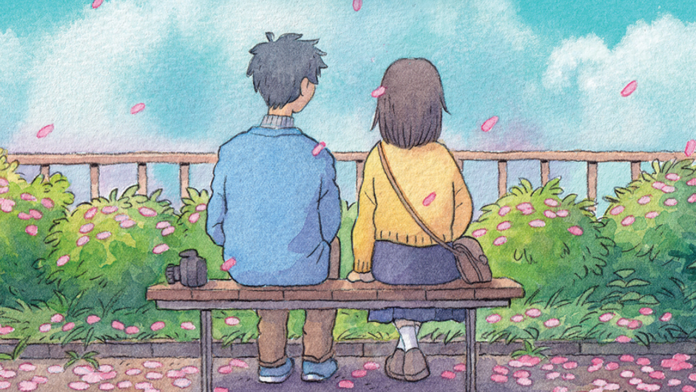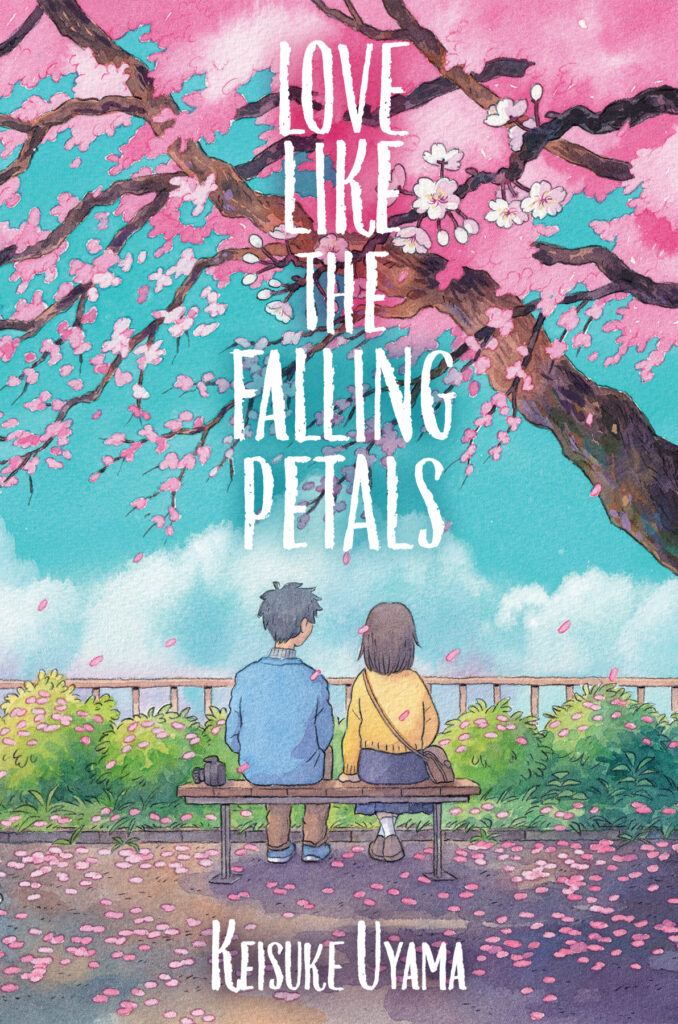As we enter peak cherry blossom season, the critically acclaimed romance novel Love Like the Falling Petals by Keisuke Uyama is a necessary read to gain a new understanding of this transient time of year. Originally published in 2017 and later and adapted into a Netflix movie in 2022, Love Like the Falling Petals recently made its English debut in February 2024. Just in time for another season showered in pink. Having received a digital review copy from Cover Press, I had the privilege of reading the English version as well as interviewing Uyama about the story’s theme and its universal message to readers across the globe. However, I wasn’t quite ready for the lingering pain of an emotional love story that forced me to sit with the discomfort of reading without seeing everything through my Americanized ideals.
Love Like the Falling Petals introduces a blossoming love through Japan’s spring sakura season, a time of year common to viewers of slice-of-life anime. Yet here the setting is beautifully tragic. In a seemingly normal meet-cute, aspiring photographer Haruto frequents a salon where he meets Misaki, a young hairstylist who dreams of opening her own studio. Haruto would accept anything to take Misaki on a date, even having his earlobe snipped off during a routine haircut. His wish of taking her to see cherry blossoms comes true, but as he foreshadows, “cherry blossoms are of course beautiful, but they fall so soon.”
As the seasons changed, so was the outlook on this couple’s story. Misaki is eventually diagnosed with progeria, a rare condition that causes her to age much faster than normal. This “fast-forward syndrome” changes Misaki’s physical appearance rapidly. Even at 23 years old she looks like an old woman by the end of the novel. The direct effects of her declining health impact her mental state and propels her into a loop of wanting to hide from the world. This drives Misaki to avoid Haruto, believing she’s unworthy of love in her state.
It’s difficult to accept Misaki focusing on her looks while depriving herself of happiness and love. As a woman you can relate to this internal struggle in a world that idolizes youthful looks, but even so the outcome here is upsetting. Misaki came to the tragic realization that she will never look like the woman Haruto fell in love with, her petals had fallen, so she rejects her own happiness. It’s easy for someone with a completely different set of ideals to judge Misaki and Haruto’s choices, but as frustrating as it is, that may just be exactly what we’re supposed to take away from Love Like the Falling Petals.
It was really uncomfortable to witness Misaki sabotage herself along with the struggle with her life nearing its end. In reality though there’s hardly a right choice when you’re in that situation. Misaki wanted to preserve her 23 year old appearance and energy in Haruto’s mind, and she succeeded. But in doing so she denied herself a relationship due to her condition. Misaki rationalized her decisions, yet her loneliness finally made her realize she wanted to be with Haruto even in her fragile state. Because despite all the excuses we say to ourselves, we still deserve love.
As much as Misaki tried to keep herself from the person she most wanted to see, it only caused her more pain during her isolation. This is what makes Love Like the Falling Petals so tragic. Grief is one of the greatest human tragedies, especially the loss of love and the people we once knew. It changes everyone involved. The hard truth is that we never get time back, even as much as we may fantasize about it. It was bittersweet that their story became one of regrets for the two lovers.
Still, as uncomfortable as it was, the changing seasons for Misaki and Haruto are a series of life circumstances and choices that teaches one to value all the choices that lead to the present. It hurts when you have regret due to denying yourself the situations and people you love most. At some point we are all faced with tough decisions, and how we approach them is a matter of accepting these choices or changing to make better choices later on.
Whether you take the time to read Love Like the Falling Petals, Uyama’s wisdom can be applied to us all. Whatever stage of life you are in now, the flowers will bloom again, and the petals will fall, but how you move forward will carry you to the next cherry blossom season.
Love Like The Falling Petals is available in English now on Amazon.
Title: Love Like The Falling Petals
Media Type: Novel
Story & Art: Keisuke Uyama
Publisher: Clover Press
Translator: Terry Gallagher




